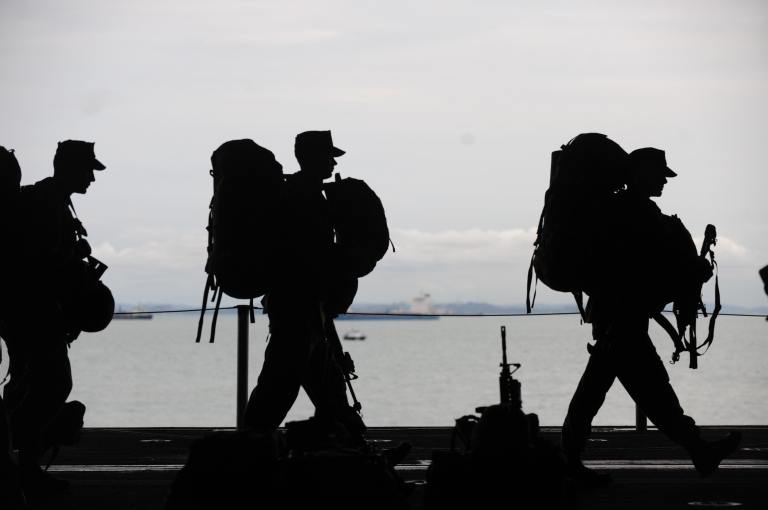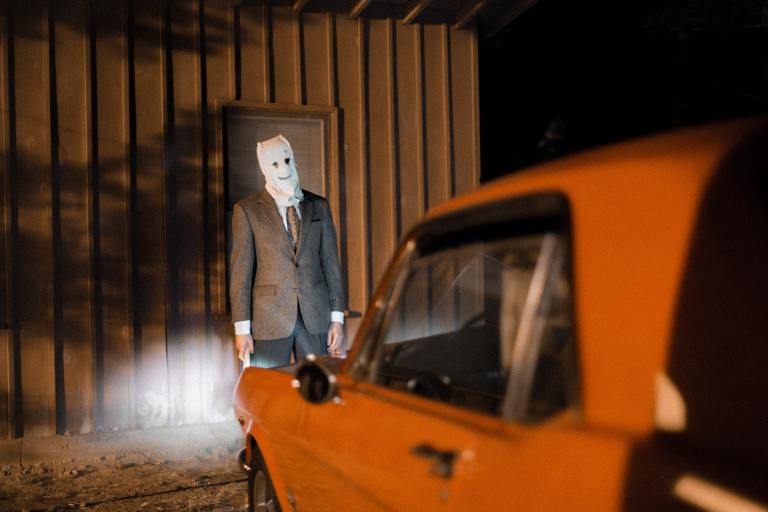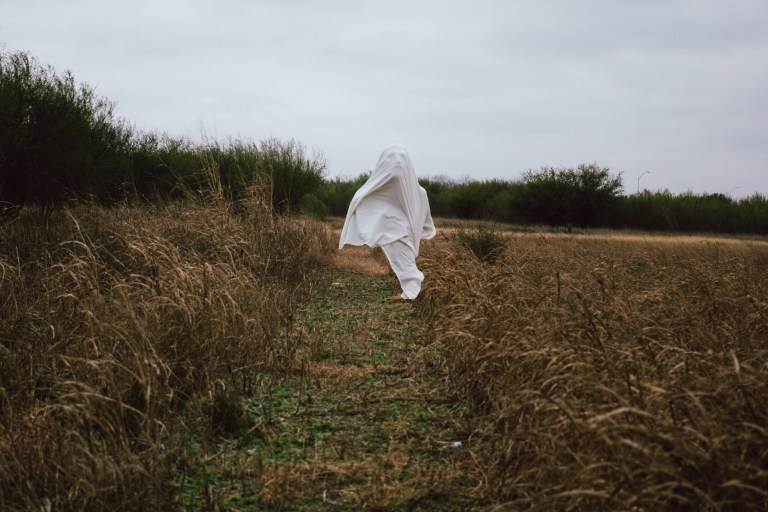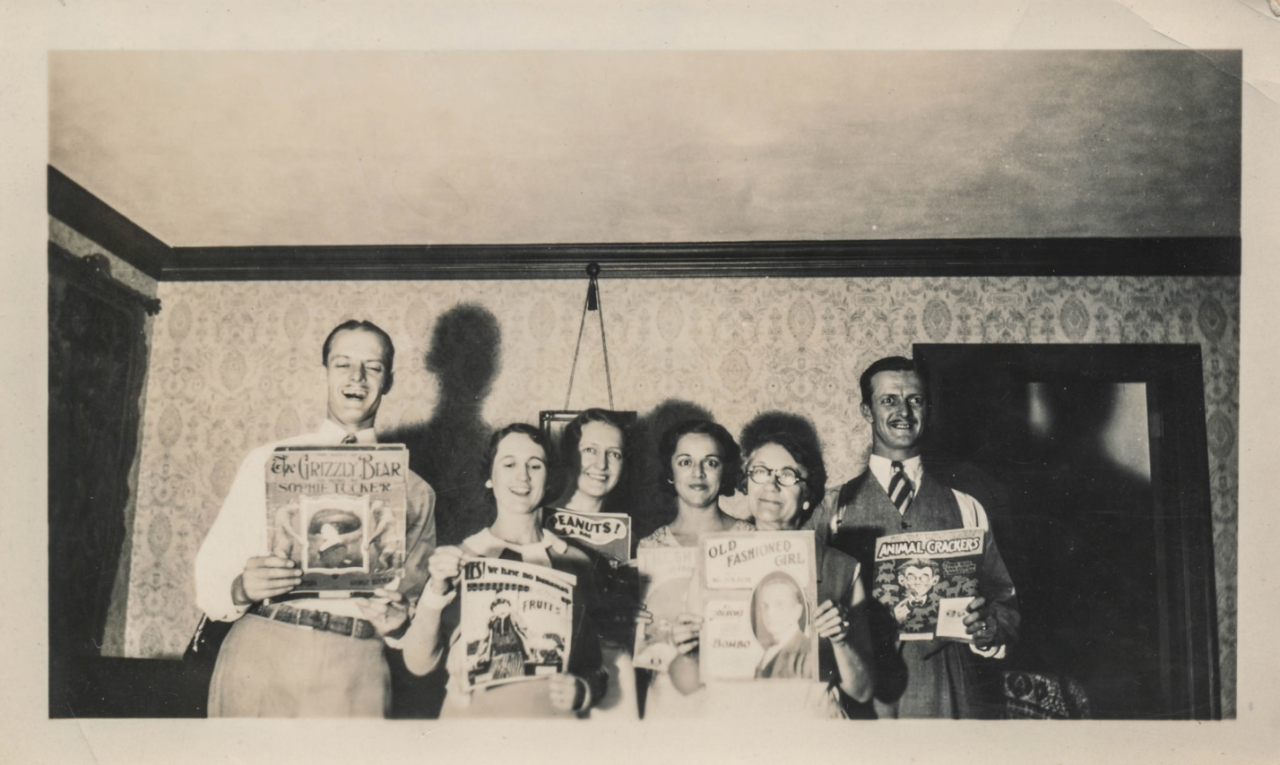
My Grandfather Died And I’ve Been Reading His Journals — I Just Came Across Something Horrible
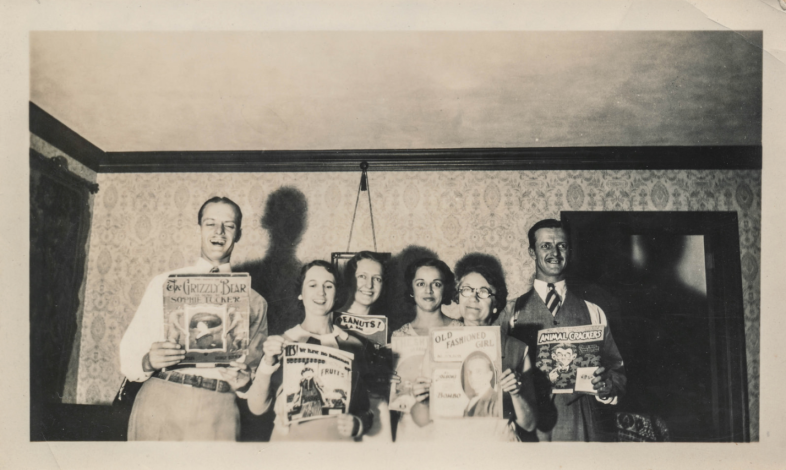
How will you be remembered?
I’m not asking what worthwhile things you’ll do in your life, nor do I care by whom you’ll be admired, respected, or even loved. I’m asking how you’ll be remembered—how your descendants will learn about you.
Far too many of us, though we may even live lives worth remembering, won’t be remembered at all. We keep no journals, no records, and once we and those who knew us pass, our only lingering mark in this world will be a small rock on a small plot of land in our local cemetery.
My grandfather, Thomas Alexander Burns, passed away two weeks ago. Though his body now rests in the frozen earth, he will be remembered. Since his death, our family has pored over his journals in which he wrote faithfully, every night, for over sixty years. In these writings we have found evidence of things we already knew—that Grandpa Tom was truly a loving husband, devoted father, brave soldier, hard worker, and great man. But we have also found a story unmatched in its horror, one which never made its way into conversations at Sunday dinner, a story which was unfamiliar to all who knew my grandfather. Perhaps it is a story that should have died with him.
Despite being a lifelong pacifist, my grandfather was drafted to fight for the United States in the Korean War. He was overseas for a period of fourteen months, and remained in the Army on inactive duty for many years following. During his service, he developed a deep sense of patriotism and found several lifelong friends among his fellow soldiers—the ones who survived, anyway. His 412th Battalion saw close combat on a regular basis, and despite not being a religious man, his entry on 4/16/56 maintains that he “only survived through the grace of the God Almighty.”
His opinions of divine intervention, though, fluctuated over time. In December of that same year, he wrote, “This season more than any other sees thanks given to a God who…if He exists at all, allowed my brothers to blead [sic] to death in the forests of Korea…I find in my heart no desire to praise or give thanks to a Being prone to such fickle interventions.”
Much of my grandfather’s writing contains similar cynicism borne of harsh experiences, and though many of his comrades were lost on many different occasions, it was the last week in February in 1952 that haunted him most of all.
This, you see, was the week that Sergeant Darwin arrived in his camp.
February 25th, 1952:
“To-day we made our preparations to enter a forest outside Seoul, and a four-day march will put us in prime position to aid troops currently engaged. A hopeless endevor [sic], is the whisper among the company—I do hope the fighting clears up in that time.
“March begins at dawn, we camp presently at the edge of an enormous wooded area that seems to have no end, I am hopeful that navigation equipment all works properly. God! The thought of losing one’s life wandering through the forest helplessly, like an ass! It does feel a bit dismal in camp though it often does on the eve of what many are calling foolishness.
“It is cold. At nights bitterly so. And once deep in the forest we will not be able to rely on fire for fear of signaling our position to the enemy or better yet burning the whole damned place to the ground, though such a blunder would surely not make the press back home . . .
“And yes it is on nights like these, when the wind howls outside the tent sending a chill through the canvas and I huddle in my cot barely even able to grip my pencil, that I miss back home the most. It is half a world away and still the distance seems to me even greater. How can it be in the same planet that my fireplace and my wife and all the comforts of home—It does actually seem that such a lovely scene could only take place on some other world!
“Alas, I am here, and the company remains largely the same though transfer has come and past, Sgt. Mayhew has been transferred to med leave and a new man Darwin come in his place. He seems to be an all right fellow.
“Well that is all for tonight. As always I try to remain hopeful.”
February 26th, 1952:
“As I said the march was scheduled to begin today and for better or worse all went off without a hitch. The terrain was light and it felt as though we had made remarkably good time as we walked. But I spent much time in conversation with the new Sergeant and he is a strange man to say the least! He rarely speaks in the same voice for more than a sentence at a time, it is as though there are a million different people inside him all trying to have their say. One moment his tone is gruff and manly and the next he sounds very quiet and timid. And often he will stop speaking in the middle of a thought all together! And then I tried to press him, ‘what were you saying?’ and he looked at me (this happened half a dozen times, at least) as though he’d never seen me before!
“This was all very peculiar but I have heard of people who suffer from diseases of the mind or possibly he’s very stressd [sic] from being in such close proximity to the combat. After all we are only a 3 day march from the forests edge and I must say every step clenches my gut a bit more. God how I hope the fighting is over when we get there. Judd on the other hand seems eager—but then he holds more prejudice toward the natives—I do worry though what he will be like when he goes home. I have heard of men who are never the same and even violent after they see extended combat.
“Excuse me I must borrow another pencil from a bunk mate as this one is down to the nub—
“—The loneliness was not so bad today as we all marched together and talked together. However I don’t much care for this forest at night time. The sounds outside chill me to the bone, I feel as though this canvas is the only thing separating me from something much worse than combat. Crickets chirp but sometimes they stop for an extended period of time and it is then that every snap of a twig sets my teeth on edge, the leaves rustle and the wind howls relentlessly, I don’t believe in ghosts of course but the sound is almost enough to make you.
“Any way it seems that Xavier is gone to bed and the rest are on their way so I will bid farewell for now. Good night, —Tom”
February 26th, 1952
“Death visited our camp and now I am terribly frightened to sleep, even though we are keeping watch vigorously. I myself am of the opinion that this madness has come from within our own camp otherwise why are we all not dead?
“I awoke earlier than usual this morning to a great commotion from another tent. We all rushed outside to see what was the matter and many were huddled around the tent with grave or panicked expressions on their faces. As Judd and I approached closer we saw that some of the men were weeping. It had just begun to get light out and the sun was not yet visible. Finally we forced our way through the crowd to look into the tent…
“Three of the five cots held dead men, throats cut deeply and blood pooled on the bottom of the tent. Both of the living soldiers were being dragged away by the MPs to be taken under questioning no doubt, although I would not expect this of either of them, McKinley and Hales I believe the other’s name is. No murder weapon was found and nobody heard anything suspicious or even out of the ordinary. It is a strange mystery as to who the culprit is but as I say I do not think this was a sneak attack from an enemy. Several men in the camp had shifty eyes today, and I feel that the culprit is perhaps one of them. Of course it also could have been McKinley or Hales but I doubt it having known McKinley well and holding a high opinion of him, and the latter being rather too small to carry out such a task.
“It is a difficult thing, to be met with death so unexpectedly. Though we are soldiers the camp is very grave to-night, one may think we would be used to loss but this was not like a combat death, which we may be desensitized toward…no, this was far more ‘close to home’ as they say. That the dead were our friends and that this crime must have been premeditated and heartless, and that they were taken in their sleep, such a vulnerable time—my God! And I shall never forget the looks on their faces, the dead men, one appearing as though he died slightly bewildered and the other two seemingly in grate [sic] pain. It was difficult to say the least, I could not keep my eyes on them for more than a few seconds.
“Still one does wonder how they did not wake their bunkmates in whatever struggle must have ensued. The men had been dead for hours, I am told, before they were discovered. Perhaps that does give credence to the suspicions that McKinley or Hales were behind it all, or perhaps both of them. They are still in the MPs custody so that is clearly an indication that they are the prime suspects. Again though my gut tells me that it was not them.
“Meanwhile I must now attempt to fall asleep. Not much marching done today as one can imagine under the circumstances—I fear we’ll have to make up the time tomorrow. Good night…”
February 27th, 1952
“Not much to report today. Still no word on the crimes of yesterday. Utterly exhausted—17 hours of marching with barely even a rest good night…”
February 28th, 1952
There is no journal entry for February 28th, 1952. As best as my family can tell, this is the only day Grandpa Tom ever missed.
Before I transcribe Grandpa Tom’s journal entry from the leap day of 1952, I feel the need to add a bit of a disclaimer: the official military record of this incident attributes the deaths of 54 soldiers (not counting the three whose throats were cut in the previous entry) to an “explosive malfunction.” The report seems almost intentionally vague.
Still, given this, I might have been inclined to doubt my grandfather’s version of events—until I spoke to other surviving members of his battalion at his funeral. Their stories corroborated with his, some even volunteering details from his journal that I hadn’t mentioned to them. This, combined with my grandfather’s lifelong displays of honesty and sanity, leads me to believe that the official record is for some reason incorrect. I am almost certain that the following events happened in exactly the way my Grandpa Tom said:
February 29th, 1952
“We are no longer on our march. In fact tomorrow morning I will be headed back to the states, or so they tell me. Right now I am writing from a military hospital bed somewhere in Korea. I don’t know where exactly. I have been injured but not too badly, an account of which follows…
“Yesterday things happened that I feel ill-equipped to explain, much less put into writing. But I shall try, because what is the point of journaling if the extraordinary is not logged while all the ordinary is? I hope to not revisit this memory much in the future but feel it is important to give a full treatment on these pages tonight.
Yesterday night at half past nine—darkness had fallen and the only sound came from a few muttered voices throughout the camp—until all of a sudden an anguished scream rang out, cries of help smattered with agonized sobs which sounded to be coming from more than one person. It all began so fast. I had had my journal in my hand and was preparing to write my entry for the day but at this sound, Judd, Vinick and I fled from our tent and were met by a horrifying sight:
“One of the tents at the far end of our camp was ablaze and the screams were coming from inside. The light from the flames illuminated the silhouettes through the tent’s canvas, four men writhing in agony. Two of the men had fallen to the tent floor and the other two were still struggling to escape. Someone near the tent shouted ‘it’s padlocked!’ apparently in reference to the zipper that would have given my trapped comrades an escape. Instead one of them cut open the canvas of the tent with a knife, but as the two remaining men spilled out of the tent screaming and sobbing it became apparent to all watching that they would not survive—though they were utterly engulfed in the flames and their human forms were barely even distinguishable their screams could be easily heard over the roar of the fire—my stomach sunk unimaginably when one of the men shouted that his eyes were melting.
“All the while Sgt. Darwin whom I mentioned a few days ago was standing near the tent wearing an expersion [sic] of utter glee, as though it were Christmas morning and he were a young child full of excitement. It didn’t take long before someone’s flashlight beam caught him (by this point the burning soldiers were crisped and twitching almost half heartedly in the dirt) and besides that awful smile it was discovered that he was holding a nearly empty can of the gasoline supply. One soldier (I think it was Wilcox) made to apprehend him when Sgt. Darwin pulled from his pocket a large buck knife. Darwin grabbed (I think Wilcox’s) throat with one hand and with the other sliced a mortal wound through his belly. A few of his guts poked out —probably his intestines, and he began to gurgle out blood as he fell to the ground.
“It was then that a shot rang out from my left side—Judd had fired at Darwin striking him in the nose directly. He staggered backward, brains and blood slopping out what was left of his face and he too fell to the ground.
“Despite the horrors of what had happened so far it was then that reality appeared to fail. Just seconds after firing the shot that killed the Sergeant, Judd gasped a sharp intake of air from next to me—I turned and looked down in horror to see a tent pole stuck through his midsection, one end of it shining red in the moon-light and the other end of it being held—as utterly insane as I know this sounds—by Sgt. Darwin. Though I had just seen him die with my own eyes.
“I backed away frightened from the murder of my dear friend but not before Darwin swung his buck knife at me, cutting the inside of my left arm which I held up to protect myself and damaging an artery (the injury for which I am currently hospitalized). But then Darwin was again felled by several rounds to the back from Hales who had previously been a suspect in the killings, and as he fell he smiled at me with a look of pure joy, perhaps the most lingering image of the whole ordeal—I cannot chase it from my mind. I could not yet turn my attention to Judd who lay dying on the ground however…because yet another Sergeant Darwin appeared behind Hales and hacked into his neck with a hatchet. The axe cut about halfway through Hales’s throat and he clutched it, and while he clutched he began to cough uncontrollably and blood sprayed from beneath his hands and also his mouth and nose. Darwin then swung the hatchet at the chest of another soldier and I could clearly hear his ribs breaking as it made impact.
“By this point—I am not sure how long before—the entire camp was in a frenzy. Many of us lay dead on the ground, I still am not sure exactly how many—but screams were echoing from everywhere. I paused to wrap my shirt around my profusely bleeding arm (a decision which likely saved my life, the doctor said) yet all the while looking around me. I could see at least five different Sgt Darwins hacking away at my comrades or otherwise mutilating them. Two of them had tied down our commanding officer Captain Frick and were in the process of soaking him in gasoline—I saw him moments later on his hands and knees as he burned alive.
“I do not remember much of what happened from this point until our escape, as I had lost a fair amount of blood, but I am told eventually my surviving comrades managed to kill the remaining Sgts. I have heard it estimated (and this seems correct to me) that nearly a dozen Sgt. Darwins met our camp that day though we could only find the body of one when all was said and done. I cannot begin to fathom what kind of sorcery or magic or devilry our camp fell victim to last night.
“It was McKinley (at one point the prime suspect of the first deaths, ha!) that saved the day and in his heroism led our survivors, wounded and all, to a place where he could radio for a rescue team . . .”
My grandfather’s entry of February 29th, 1952 continues for several more pages, detailing the rescue efforts and then some rambling thoughts on the events of that night (I’m not sure how lucid he was by the end of the entry—he simply signed it with an ‘X’). But I find little if any reason to doubt his version of events, as the multiple Sergeant Darwins were corroborated by several of his fellow soldiers independently. Like Grandpa Tom, I cannot begin to fathom how such a thing could happen.
Though I’m beyond grateful for the rest of his journal entries, this is truly a story I wish I’d never heard. Since reading it, I’ve often found my dreams haunted—by burning soldiers and agonized screams, and by the depraved grin on the culprit’s face as he fell, dead, at my grandfather’s feet. But perhaps its most insidious effect has been in how I remember my grandfather now. For although the memories of bouncing on his knee and the health-food smell of his house still linger, they’re tainted by the terrible tale of Sergeant Darwin.
How will you be remembered? That’s for you to decide, of course—but if you have any stories like my grandfather’s, perhaps you should keep them to yourself. ![]()


